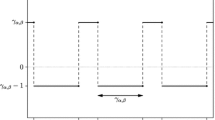Abstract
The recourse function in a stochastic program with recourse can be approximated by separable functions of the original random variables or linear transformations of them. The resulting bound then involves summing simple integrals. These integrals may themselves be difficult to compute or may require more information about the random variables than is available. In this paper, we show that a special class of functions has an easily computable bound that achieves the best upper bound when only first and second moment constraints are available.
Similar content being viewed by others
References
A. Ben-Tal and E. Hochman, More bounds on the expectation of a convex function of a random variable. J. Appl. Prob. 9 (19720 803–812.
J.R. Birge and S.W. Wallace, A separable piecewise linear upper bound for stochastic linear programs, SIAM J. Control Optim. 26 (1988) 725–739.
J.R. Birge and R.J.-B. Wets, Designing approximation schemes for stochastic optimization problems, in particular, for stochastic programs with recourse, Math. Progr. Study 27 (1986) 54–102.
J.R. Birge and R.J.-B. Wets, Sublinear upper bounds for stochastic linear programs with recourse, Math. Progr. 43 (1989) 131–149.
J.R. Birge and R.J.-B. Wets, Computing bounds for stochastic programming problems by means of a generalized moment problem, Math. Oper. Res. 12 (1987) 149–162.
T. Cipra, Moment problem with given covariance structure in stochastic programming, Ekonom.-Mat. Obzor 21 (1985) 66–77.
G.B. Dantzig,Linear Programming and Extensions (Princeton University Press, Princeton, NJ, 1963).
P.J. Davis and P. Rabinowitz,Methods of Numerical Integration (Academic Press, Orlando, FL, 1984).
J. Dulá, Bounds on the expectation of convex functions, Ph.D. dissertation, The University of Michigan, Ann Arbor, Michigan (1986).
J. Dulá, An upper bound on the expectation of simplicial functions of multivariate random variables, Math. Progr., to appear.
J. Dupačová, Minimax stochastic programs with nonconvex nonseparable penalty functions, in:Progress in Operations Research, A. Prékopa (ed.) (North-Holland, Amsterdam, 1976) pp. 303–316.
J. Dupačová, Minimax approach to stochastic linear programming and the moment problem. Recent results, ZAMM 58 (1977) T466–467.
H.P. Edmundson, Bounds on the expectation of a convex function of a random variable, The Rand Corporation Paper 982, Santa Monica, CA (1956).
Y. Ermoliev, A. Gaivoronski and C. Nedeeva, Stochastic optimization problems with partially known distribution functions, SIAM J. Control Optim. 23 (1985) 696–716.
K. Frauendorfer, Solving SLP recourse problems with arbitrary multivariate distributions — the dependent case, Math. Oper. Res. 13 (1988) 377–394.
K. Frauendorfer, Solution methods for linear-quadratic stochastic optimization problems, presented at the5th Int. Conf. on Stochastic Programming, Ann Arbor, Michigan (August 1989).
K. Frauendorfer and P. Kall, A solution method for SLP recourse problems with arbitrary multivariate distributions — the independent case, Problems Control Inf. Theory 17 (1988) 177–205.
H. Gassmann and W.T. Ziemba, A tight upper bound for the expectation of a convex function of a multivariate random variable, Math. Progr. Study 27 (1986) 39–53.
D. Hausch and W.T. Ziemba, Bounds on the value of information in uncertain decision problems II, Stochastics 10 (1983) 181–217.
R. Hettich, An implementation of a discretization method for semi-infinite programming, Math. Progr. 34 (1986) 354–361.
C.C. Huang, W. Ziemba and A. Ben-Tal, Bounds on the expectation of a convex function of a random variable: with applications to stochastic programming. Oper. Res. 25 (1979) 315–325.
R. Jagannathan, A minimax procedure for a class of linear programs under uncertainty, Oper. Res. 25 (1977) 173–177.
J.L. Jensen, Sur les fonctions convexes et les inégalités entre les valeurs moyennes, Acta Math. 30 (1906) 175–193.
P. Kall, Stochastic programming with recourse: upper bounds and moment problems — a review, inAdvances in Mathematical Optimization, J. Guddat (ed.) (Akademie-Verlag, Berlin, 1988) pp. 86–103.
P. Kall, An upper bound for SLP using first and total second moments, this volume.
P. Kall and D. Stoyan, Solving stochastic programming problems with recourse including error bounds, Math. Operationsforsch. Statist. Ser. Optim. 13 (1982) 431–447.
A. Karr, Extreme points of certain sets of probability measures, with applications, Math. Oper. Res. 8 (1983) 74–85.
J.H.B. Kemperman, The general moment problem, a geometric approach, Ann. Math. Statist. 39 (1968) 93–122.
M. Krein and A. Nudelman, The Markov moment problem and extremal problems, Translation of Mathematical Monographs, 50 (The American Mathematical Society, Providence, RI, 1977).
C. Lemaréchal and R. Mifflin, Global and superlinear convergence of an algorithm for one-dimensional minimization of convex functions, Math. Progr. 24 (1982) 241–256.
A. Madansky, Bounds on the expectation of a convex function of a multivariate random variable. Ann. Math. Statist. 30 (1959) 743–746.
R. Mifflin and J. Strodiot. Reliable and rapid univariate minimization without derivatives, presented atTIMS/ORSA Joint National Meeting, Los Angeles, CA (April, 1986).
A.C. Miller, III, and T.R. Rice, Discrete approximations of probability distributions, Manag. Sci. 29 (1983) 352–362.
G. Peano, Residuo in formulas de quadratura, Mathesis 39 (1914) 5–10.
T.J. Rivlin,An Introduction to the Approximation of Functions (Blaisdell, Waltham, MA, 1969).
R.T. Rockafellar,Convex Analysis (Princeton University Press, Princeton, NJ, 1970).
N.M. Roy, Extreme points of convex sets in infinite dimensional spaces, Am. Math. Monthly 94 (1987) 409–422.
H. Scarf, A minimax solution of an inventory problem, in:Studies in the Mathematical Theory of Inventory and Production, K.J. Arrow, S. Karlin and H. Scarf (eds.) (Stanford University Press, Stanford, CA, 1958).
F.A. Valentine,Convex Sets (McGraw-Hill, New York, 1964).
S. Wallace, A piecewise linear upper bound on the network recourse problem, Math. Progr. 38 (1987) 133–146.
J. Žáčková, On minimax solutions of stochastic linear programming problems, Časopis pro Pěstování Matematiky 91 (1966) 423–430.
Author information
Authors and Affiliations
Additional information
This research has been partially supported by the National Science Foundation under Grants ECS-8304065 and ECS-8815101, by the Office of Naval Research Grant N00014-86-K-0628 and by the National Research Council under a Research Associateship at the Naval Postgraduate School, Monterey, California.
Rights and permissions
About this article
Cite this article
Birge, J.R., Dulá, J.H. Bounding separable recourse functions with limited distribution information. Ann Oper Res 30, 277–298 (1991). https://doi.org/10.1007/BF02204821
Issue Date:
DOI: https://doi.org/10.1007/BF02204821




